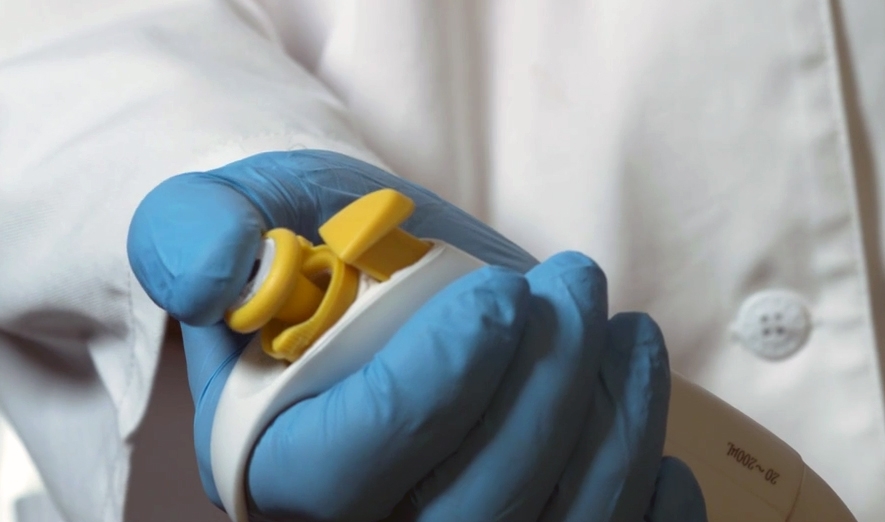What is RSI?
RSI is an acronym for repetitive strain injury which occurs when the same physical movements are repeated over an extended period of time. A repetitive strain injury is an injury to a part of the body that is caused by overusing or straining that body part. “Strain occurs when the body part is called on to work harder, stretch farther, impact more directly or otherwise function at a greater level than prepared for¹ [ ergonomics.about.com/od/repetitivestressinjuries/f/whatisrstraini.htm ].”
RSIs can do damage to tendons, nerves, muscles, and other soft body tissues. Repetitive strain injury generally results from using the body for a task that it is either not designed to perform or capable of comfortably working. Although (RSI) is frequently associated with computer users, it can also affect those who work in the laboratory.
Have you ever experienced aches and pains after a long session of pipetting? Have you ever experienced numbness, tingling, or a burning sensation in your arms and forearms? If you answered yes, to either or both of those questions, you may be experiencing symptoms of repetitive strain injury. Worn pipettes and poor pipetting techniques are two primary factors that contribute to laboratory RSI.
Repetitive Strain Injury In The Laboratory
Did you know that pipetting in the laboratory is one of the most repetitive tasks in the lab?
Pipetting is commonplace in the laboratory, so, it is not too hard to believe that hand pain due to pipetting is also a common problem in the lab. Although RSI is frequently associated with computer operators, laboratory technicians have reported hand and shoulder ailments while using modern plunger-operated pipettes.
Hand And Shoulder Ailments Among Laboratory Technicians Using Modern Plunger-Operated Pipettes.
In a 1994 study conducted in Sweden, 128 female laboratory technicians employed by university research laboratories working with plunger-operated pipettes were compared to 25,378 female Swedish state employees in general. “The prevalence of hand ailments among the laboratory assistants was found to be twice that among female state employees in general.” The study also found that pipetting for more than 300 hours per year contributed to an increased risk of hand and shoulder ailments.
A questionnaire survey of the ergonomic problems associated with pipettes and their usage with specific reference to work-related upper limb disorders.
A study conducted in 1997 in the United Kingdom, which comprised of 80 pipette users and 85 non-pipette users (control population) determined that the reported occurrence of elbow and hand complaints were significantly higher for the pipette users. “There is an increase in the percentage of those reporting hand complaints as the duration of the working period involving continuous use of pipettes increases.” An astounding 90% of pipette users who exceeded 60 minutes of continuous operation reported hand complaints.
Symptoms Of RSI
Although they may vary, symptoms generally include pain, fatigue, tingling, clumsiness, coldness, and numbness in the arms, legs, neck, upper and lower back. For example, computer users may experience pain in their arms after extended periods of typing. Some computer users who switch from doing a majority of typing on their desktop to a laptop may experience pain shortly after the switch. Symptoms will develop gradually and will continue to worsen over time if left untreated. For lab technicians using pipettes, symptoms mainly occur in the shoulders, arms, and hands.
Look for these warning signs:
- Muscle discomfort
- Aches and pains
- Coldness
- Muscle tension
- Tingling and numbness
Causes Of RSI
Although there a number of factors that can cause RSI, performing repetitive tasks such as pipetting, where the hand and arm muscles are held tight and tense for extended periods of time, can lead to the development of RSI. As muscles and tendons become overused they may be strained beyond their capacity.
Listed below are factors that can lead to RSIs:
- Repetitive movement (e.g. pipette plunger)
- Awkward postures
- Prolonged muscle tension (e.g. holding pipette)
- Forceful holding or movement (e.g. liquid transfer from one receptacle to another)
- Poor ergonomics
- Poor work practices (e.g. improper pipetting technique)
- Stress (e.g. cluttered lab)
Identifying the root cause is essential to properly treating RSI. Left untreated symptoms will gradually worsen and could ultimately impact your bench science career.
6 Tips To Prevent RSI In The Lab While Pipetting
Although these tips are geared mainly towards pipetting, they can easily be applied to other repetitive tasks that you perform throughout the course of a normal day in your lab.
1) Relax
Stay relaxed physically and mentally while pipetting. As discussed earlier, stress, prolonged muscle tension, and poor ergonomics are all contributing factors to developing repetitive strain injury. Avoid awkward positions while pipetting and make sure to follow proper pipetting techniques.
2) Maintain Good Posture
Regardless of the activity, typing a report on your computer or pipetting, you want to ensure that you are sitting properly and maintain good posture (your back will thank you). Your spine is strong and stable when you practice healthy posture. Slouching makes it difficult for your muscles and ligaments to keep you balanced and can lead to back pain, headaches, and other problems. Avoid dangling your feet, hunching your shoulders, or contort your neck when pipetting liquids.
3) Ergonomics
Ensure that your hand-adjustable stool is appropriate for the task. Most chairs offer multiple adjustment options to elevate or lower you to the specific height required for the task. Remember that poor ergonomics and poor posture can lead you to developing RSI.
4) Use A Timer
The longer the repetitive activity, the greater the chance of developing an injury. Incorporating a lab timer into your work process will ensure that you provide yourself with the necessary breaks to prevent strain from pipetting, as well as a mental break that will allow you to refocus on the task at hand.
5) Just Say No To Clutter
An organized lab is a happy lab. By organizing your workstation you will reduce clutter, increase lab safety, and improve overall ergonomics. If you organize your workstation properly, you can determine which supplies (pipette tips, buffers, samples) you need on a regular basis and place them accordingly while minimizing awkward postions. I encourage you to check out our post on The 5S Approach To A Lean Lab for more information regarding this topic.
6) Find The Right Pipette
Not all pipettes are created equal. There are many different pipette manufacturers and models available. One major factor to consider when either using your current pipette or selecting a new one is the operational pressure required to operate the pipette. If you have already begun to experience pain while pipetting, you may want to consider a pipette model that requires reduced operating forces. Additionally, you will want to review the weight of the pipette and the ergonomics (finger hook, plunger configuration, tip ejector).Another alternative for those who are already experiencing symptoms of RSI would be to consider an electronic pipette, they may be heavier but require little operating force to aspirate and dispense. After you have selected your pipette or reviewed your existing pipette, make sure that you are using a compatible pipette tip.
Now that we have covered what repetitive strain injury is, the symptoms, how it is caused, and six tips to help you avoid developing repetitive strain injuries while working in your laboratory, you can now be able to get back to pipetting safely.
What To Do If You Think You Have RSI
If you have experienced or develop these symptoms it is recommended that you speak with an occupational health professional at your facility or your physician.
Helpful Video on Pipetting Safety & Ergonomics
(Video Source: UCLA Environment, Health, & Safety)
Sources
[ ergonomics.about.com/od/repetitivestressinjuries/f/whatisrstraini.htm ]Danger: You Might Be Pipetting Yourself Out Of A Job
Repetitive Strain Injury: The Hidden Lab Hazard
Hand and shoulder ailments among laboratory technicians using modern plunger-operated pipettes.
Additional Resources
Laboratory Work With Automatic Pipettes: A Study On How Pipetting Affects The Thumb


Thank you for sharing your information about RSI! I had been in a similar situation and found strength to not give up in websites like yours!
I am currently assembling a Google map with physicians and physical therapists who have substantial knowledge of RSI (Repetitive Strain Injury). I was wondering if you know any good medical people I could additionally recommend on my map? //www.rsipain.com/physical-therapists.php
I created the website after I had been suffering from RSI for over 3 years. It’s my personal story (22,000+ words) combined with advice on prevention, self-treatment, ergonomic equipment and I hope that it will help fellow sufferers overcome their pain.
Thank you for your help!
Clemens
Hi Clemens,
I’m glad that you found our post helpful! I’d like to help you with locating physicians and physical therapists who specialize in RSI education and treatment. You’ve created a very nice site that provides users with a great deal of information. Please keep an eye out for an email from me with more information.
Thank you!
Kevin